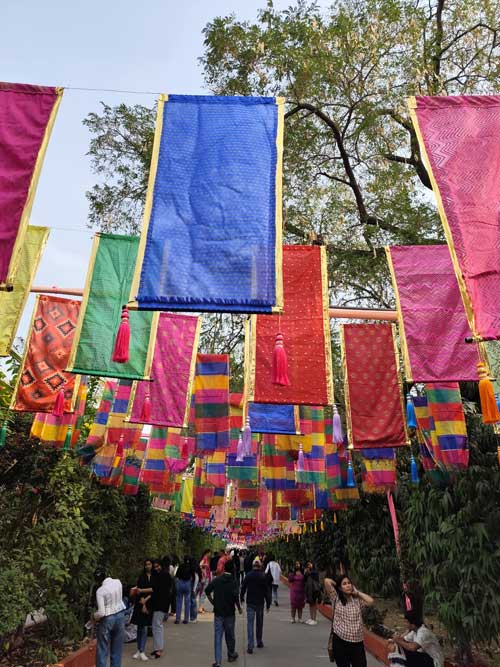Books | Web Exclusive: Jaipur Literature Festival
JLF: Bigger and Bigger
The 18th edition of the Jaipur Literature Festival proves why it is the matriarch of its tribe
 Nandini Nair
Nandini Nair
 Nandini Nair
04 Feb, 2025
Nandini Nair
04 Feb, 2025
At the entrance of Durbar Hall two artists sit bent over a sprawling painting of a tree with animals residing on its branches. On day four of the Jaipur Literature Festival (January 30 to February 3), held at Clarks Amer, they were adding the final touches to the canvas. While attendees to JLF buzzed around and stopped only to take a photo or video, the Gond master artist Ram Singh Urveti and his assistant remained engrossed in their work. Their grip on the brush was as steady and unflinching as their attention to their canvas. The work before them engrossed them so wholly and completely that the rest of the world was rendered invisible.
These two artists are an apt reminder of the toil of an artist. They devote years (sometimes decades) to their craft. And to do so they must silence the noise of the world, and demands of the community. We, the public, only see the final product of their efforts, and not the labour that has gone into it. The 18th Jaipur Literature Festival is a celebration (rightfully) of the final product— the novels that authors have conjured into being, the nonfiction books that have been meticulously researched, the poems that slice the truth. In the hullabaloo around the bound book, the book between covers, here was an aide-memoire of the writer at the desk. We celebrate the author and her books, but while doing so we must also heed the sacrifices made and the labour involved. And a well-curated. festival must bring together all these elements; the process and the product.

In its 18th year, JLF is a well-oiled beast. Literature festivals have mushroomed across the country. While every metro city now has one (or more) , so do tier-two cities from Nagpur to Lucknow, Dehradun to Puducherry. But the grande dame amongst them all is still very much JLF, whose programming runs without glitch or hiccup, even while encompassing over 300 speakers, numerous venues and multiple sessions. Over the years, JLF has repeatedly outdone itself in pomp and grandeur, capitalising on the high aesthetics and intense hospitality of Rajasthan. For many international speakers for whom this was the first time in India, the splendour of the hotels, the majesty of the parties, was as bewildering as it was memorable.
Every year, JLF seems to get bigger and bigger. By the weekend, the crowds at Clarks Amer were so viscous that to go from venue to venue felt like one was a bug wading through tunnels of honey. The crowds at JLF also seem to be getting younger, and as a leading publisher rightly said, “It seems like every 20-year-old from Jaipur is at Clarks Amer.” The young attendees were often dressed to the hilt, but with the sun shining down, they often seemed a tad too ruddy in their leather outfits and thick jackets. The nonfiction sessions were especially well attended, and in these venues once all the seats had been occupied and the floor space nabbed, people were even willing to stand in corners and listen for nearly an hour.
While all the authors seek refuge in the Author’s Lounge once their sessions are done, those who were invariably mobbed outside were Javed Akhtar and Shashi Tharoor. With time, their legions of fans only seem to expand. There was a moment of great excitement when former UK Prime Minister Rishi Sunak entered the festival. This year, JLF featured sessions with Akshata Murty and Sudha Murty. The sessions by Nobel prize winners like Venki Ramakrishnan, Esther Duflo and Abhijit Banerjee brought in the spectators. But they did not receive the visceral public adulation which was reserved for the likes of Sudha Murty, who had to be escorted by bouncers all the way.
As expected, there was the odd fracas too, regarding a speaker who took too much stage time, depriving another one of an opportunity to speak. And controversy over an interview with a with Palestinian envoy.
Writing a book (creating an art work) is a solitary business. A business that requires care and attention and solitude, as Ram Singh Urveti reminded us. It is also a business that needs to be celebrated. And one could see this celebration at the jam-packed venues, and at the Crossword Bookstore at the Clarks Amer. The store was as packed as a Delhi metro station at peak hour. But what sight could make a writer happier than seeing lines of readers queue up to buy their book and then stand in snaking lines to get them signed?
More Columns
Rebels Without a Cause Anup Rau
Giorgio Armani (1934-2025): The Perfect Fit Kaveree Bamzai
Indira Tiwari’s World Kaveree Bamzai